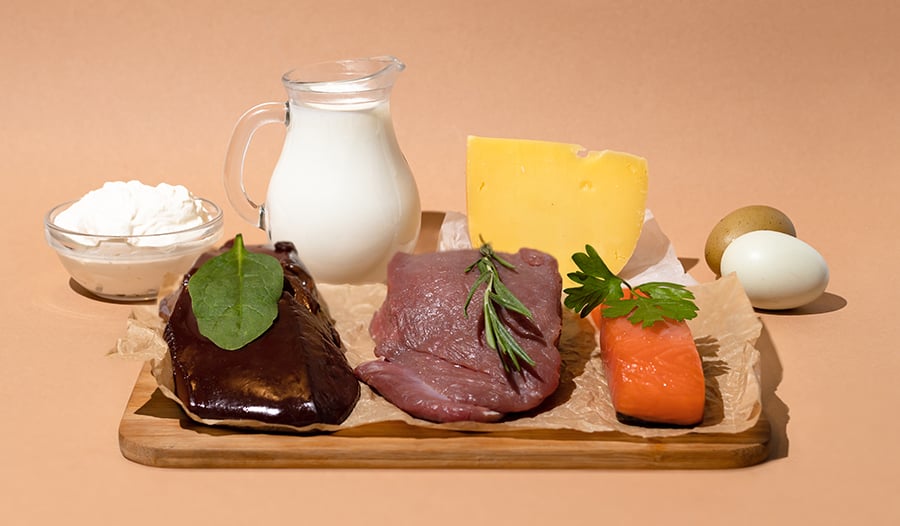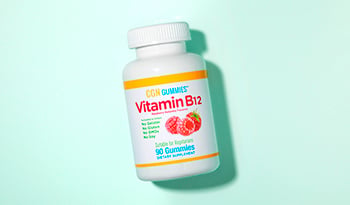Vitamin B12 Foods: Best Natural Sources of B12
DISCLAIMER:This blog does not intend to provide diagnosis...
- In this article:
- 7 Foods Rich In Vitamin B12
- What Is Vitamin B12?
- Signs Of Low Vitamin B12
- Causes Of Vitamin B12 Deficiency
- Benefits Of Vitamin B12
- When To Take Vitamin B12 Supplements
- Key Takeaways

Some of the best vitamin B12 foods are animal products, leaving those following a vegetarian or vegan diet at risk of vitamin B12 deficiency and megaloblastic anemia.
Discover the top vitamin B12 food sources and find out who may benefit from vitamin B12 supplements.
7 Foods Rich In Vitamin B12
Vitamin B12 is produced by certain intestinal bacteria residing in the gut of animals, which explains why vitamin B12 is predominantly found in animal foods.
The human body can’t produce vitamin B12, and adequate dietary intake is crucial to promote healthy body stores and prevent vitamin B12 deficiency.
Here are seven of the best vitamin B12 food sources.
1. Organ meat
Organ meat, especially liver, is an incredibly rich source of vitamin B12 and other B vitamins, including folic acid.
According to U.S. Department of Agriculture (USDA) data, four ounces (113 grams) of beef liver contains 76 micrograms of vitamin B12, considerably more than the recommended daily allowance (RDA) of 2.4 micrograms.
In addition to animal liver, other organ meats, including heart, brain, and kidneys, are also exceptional vitamin B12 food sources.
2. Meat
Beef, lamb, pork, venison, and bison are foods high in vitamin B12.
While the exact vitamin B12 content of meats depends on the specific cut and cooking method, most types of meat contain around three micrograms of vitamin B12 per four-ounce serving.
3. Fish
Fish, especially oily fish species such as salmon, tuna, sardines, and trout, are another great dietary source of vitamin B12.
A four-ounce serving of cooked salmon contains between 3 and 5 micrograms of vitamin B12, making it a nutritious option to minimize the risk of vitamin B12 deficiency.
4. Seafood
Mussels and clams are rich sources of vitamin B12, with cooked clams ranking among the top B12-containing foods, providing up to 100 micrograms per four-ounce serving.
5. Poultry
While chicken and turkey don’t contain as much vitamin B12 as meats and seafood, poultry still contributes to overall vitamin B12 intake as part of a healthy diet.
Roasted chicken breast offers around 0.5 micrograms of vitamin B12 per four-ounce serving.
6. Eggs
Two chicken eggs provide 50 percent of the RDA of vitamin B12, making eggs a nutritious choice to support vitamin B12 stores for those who don’t like to eat meat.
7. Dairy products
Although dairy products, such as milk, yogurt, and certain cheeses, contain only small amounts of vitamin B12, evidence published in Animal Frontiers highlights that whole milk consumption remains a major source of vitamin B12 for humans.
What Is Vitamin B12?
Vitamin B12, or cobalamin, is an essential vitamin belonging to the B vitamin complex that plays a crucial role in various bodily functions.
Here are the essential functions of vitamin B12:
- Promotes energy production
- Regulates DNA synthesis
- Facilitates the maturation of red blood cells
- Maintains neuronal health and nervous system function
- Supports cognitive functions and mood regulation
Signs Of Low Vitamin B12
Because vitamin B12 is involved in maintaining various critical physiological functions, vitamin B12 deficiency can manifest in a wide range of signs and symptoms.
Vitamin B12 is essential for the maturation of red blood cells, and lack of adequate vitamin B12 can cause megaloblastic anemia, characterized by large and immature red blood cells, unexplained tiredness, shortness of breath, and a rapid heartbeat.
Low vitamin B12 levels are associated with neurological issues, including:
- Numbness or tingling in hands and feet
- Poor balance and difficulty walking
- Cognitive issues
- Mental confusion
- Mood changes, including depression and irritability
- Vision problems
In addition, vitamin B12 deficiency can impair cellular energy-making processes, leading to fatigue and weakness, and has been associated with gastrointestinal issues, including nausea, vomiting, mouth ulcers, and a swollen tongue.
Causes Of Vitamin B12 Deficiency
Low vitamin B12 status is common, and according to a study published in Clinical Medicine, between 15 and 20 percent of adults have inadequate vitamin B12 levels or are deficient.
While vegans and vegetarians are vulnerable to vitamin B12 deficiency due to a potential lack of dietary vitamin B12, older adults are also at increased risk of low vitamin B12 as a result of age-related intestinal changes.
The intestinal absorption of vitamin B12 requires a protein called intrinsic factor, released by specialized cells in the stomach. Intrinsic factor binds to vitamin B12 and protects it from the harsh acidity of hydrochloric acid, commonly known as stomach acid.
Intrinsic factor production declines with age and is associated with significantly lower vitamin B12 absorption, which can lead to vitamin B12 deficiency despite consuming plenty of vitamin B12-rich foods.
Research published in the Journal of Blood Medicine suggests that as many as 50 percent of vitamin B12 deficiency cases are caused by pernicious anemia, an autoimmune disease characterized by immune cells destroying intrinsic factor-producing cells.
Other factors linked to poor vitamin B12 absorption:
- Use of gastric acid inhibitors such as proton pump inhibitors (PPIs) and antacids
- Low stomach acid
- Digestive disorders, including Crohn's disease and inflammatory bowel disease (IBD)
- Excessive alcohol consumption
In addition, many vegans and vegetarians sprinkle nutritional yeast on their foods or rely on vitamin B-12 fortified products such as breakfast cereals and non-dairy milk, including almond milk, to obtain daily vitamin B12 requirements.
However, it’s important to note that the type of vitamin B12 used in fortified foods is generally poorly absorbed and not as potent as the vitamin B12 found in animal foods, which can further exacerbate the risk of vitamin B12 deficiency in people consuming predominant plant-based foods.
Benefits Of Vitamin B12
Maintaining optimal vitamin B12 levels not only promotes red blood cell production and DNA synthesis but also may support skin and skeletal health and has been found to lower the risk of cardiovascular disease.
Here are four health benefits of vitamin B12.
1. Promotes heart health
Research published in JAMA Network Open found that individuals with low vitamin B12 status are at an increased risk of heart disease.
Vitamin B12 helps regulate the body’s levels of homocysteine, an amino acid linked to cardiovascular disease, stroke, and other health issues.
2. May help support better moods
Vitamin B12 is involved in the production of serotonin, a neurotransmitter that regulates moods and contributes to feelings of well-being.
A long-term study published in The American Journal of Nutrition investigated the effects of vitamin B12 intake on depression and concluded that individuals with the highest vitamin B12 intake were at a significantly lower risk of developing depression than those with lower B12 intake.
3. Skin and hair health
Vitamin B12 helps regulate DNA synthesis, making it a crucial nutrient for cellular regeneration and tissue repair, which is essential in skin health and hair growth.
Evidence published in the American Journal of Clinical Dermatology confirms the benefits of vitamin B12 for skin health and highlights that vitamin B12 deficiency is associated with nail and skin changes, acne, dermatitis, and other skin-related issues.
4. Skeletal health
The importance of vitamin B12 for bone health is often overlooked.
According to research published in Nutrients, vitamin B12 deficiency appears to increase the risk of osteoporosis and hip fractures in later life.
It’s believed vitamin B12’s potential bone-protective properties are due to its role in regulating homocysteine, which has been linked to poor bone mineral density, a primary risk factor for osteoporosis.
When To Take Vitamin B12 Supplements
It's generally recommended that individuals following a plant-based diet and older adults take vitamin B12 supplementation due to their increased risk of vitamin B12 deficiency.
In addition, vitamin B12 supplementation has been found beneficial for individuals with chronic gastrointestinal conditions, who often experience nutrient malabsorption.
Pregnancy is a time of heightened vitamin B12 requirements, and a study published in Advances in Nutrition found that deficiency can increase the risk of pregnancy-related complications.
Prenatal vitamins containing vitamin B12 can offer a convenient way to promote vitamin B12 levels in pregnant women and breastfeeding mothers, especially those who don’t regularly consume animal products.
While vitamin B12 is generally considered safe and well tolerated, it’s crucial to discuss the use of vitamin B12-containing dietary supplements with a healthcare provider to minimize the risk of side effects or drug interactions.
Key Takeaways
Vitamin B12 is essential in maintaining nervous system functions, regulating red blood cell production, and facilitating DNA synthesis.
The best vitamin B12 foods are animal products such as organ meats, fish, seafood, and poultry, leaving vegans and vegetarians at increased risk of vitamin B12 deficiency linked to various adverse health effects.
Older adults and those with digestive disorders may not absorb adequate amounts of dietary vitamin B12, and taking a vitamin B12 supplement is an excellent strategy to prevent deficiency and support optimal body stores.
References:
- https://fdc.nal.usda.gov/fdc-app.html#/food-details/169451/nutrients
- https://academic.oup.com/af/article/4/2/32/4638653
- https://www.ncbi.nlm.nih.gov/pmc/articles/PMC4953733/
- https://www.ncbi.nlm.nih.gov/pmc/articles/PMC3441227/
- https://jamanetwork.com/journals/jamanetworkopen/fullarticle/2788494
- https://www.ncbi.nlm.nih.gov/pmc/articles/PMC2904034/
- https://link.springer.com/article/10.1007/s40257-014-0107-3
- https://www.ncbi.nlm.nih.gov/pmc/articles/PMC4446754/
- https://www.ncbi.nlm.nih.gov/pmc/articles/PMC4561829/
- https://www.drberg.com/blog/a-simple-test-for-low-stomach-acid
- https://www.drberg.com/blog/7-ways-to-improve-bone-health

 By Dr. Eric Berg, D.C.
By Dr. Eric Berg, D.C.


